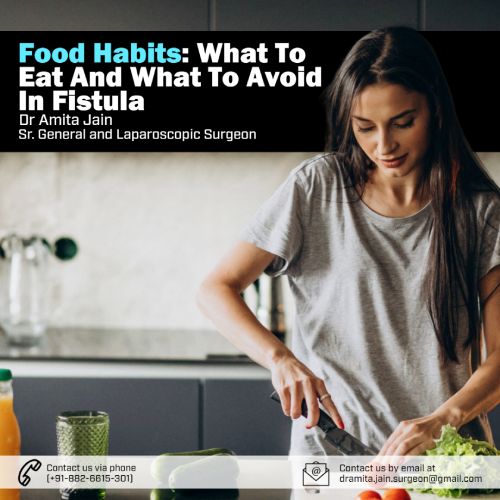Shares India’s Top Laparoscopic Surgeon for Fistula Dr. Amita Jain
A fistula is an abnormal connection or passageway that forms between two organs, vessels, or structures in the body that are not normally connected. It can develop as a result of injury, infection, inflammation, or surgery. Fistulas can occur in various parts of the body, including the digestive system, the urinary system, the reproductive system, and even between blood vessels.
A fistula typically forms near the upper part of the inner buttock where glands are located. Infection of these glands, known as a perianal abscess, can lead to the development of a fistula.
Dr Amita Jain, India’s top laparoscopy surgeon for fistula, shares a few diet tips that might help relieve the pain and discomfort when one is suffering from a fistula.
What is a good diet to keep a fistula in check?
1. Fibre-Rich Foods – Incorporate fiber-rich foods into your diet to promote bowel regularity and prevent constipation, which can exacerbate fistula symptoms. Choose fruits like apples, berries, and pears, as well as vegetables such as cabbage, broccoli, cauliflower, spinach, radish, tomatoes, carrots, etc. Whole grains like oats, quinoa, and brown rice are excellent choices too.
2. Hydration – Stay well-hydrated by drinking an adequate amount of water throughout the day. Sufficient water intake promotes soft stools and prevents dehydration, which is essential for overall health.
3. Eat Vegetables, fruits and nuts – A diet rich in vegetables, fruits, and nuts can aid in treating fistula by promoting healing, reducing inflammation, and providing essential nutrients. Foods like leafy greens (spinach, kale), fruits (berries, papaya), and nuts (almonds, walnuts) offer vitamins, minerals, and antioxidants that support the body’s recovery process. Additionally, these foods are easily digestible, easing the strain on the digestive system, which can be beneficial for those with fistulas.
4. Healthy Fats – Consume healthy fats from sources like avocados, nuts, seeds, and olive oil. These fats help in nutrient absorption and provide a source of energy.
5. Probiotics – Probiotic-rich foods like yogurt and fermented products can aid gut health by promoting the growth of beneficial bacteria. This can be particularly helpful for patients with digestive system fistulas.
6. Fish – Salmon, mackerel, and sardines are omega-3-rich fish with anti-inflammatory properties. They aid people with certain types of fistulas by reducing inflammation and are easily digestible for those with gastrointestinal issues.
Food to avoid to keep the fistula in check?
1. Spicy Foods – Spicy and acidic foods can irritate the digestive tract and worsen symptoms for some fistula patients. Common culprits include hot peppers, tomatoes, citrus fruits, and vinegar.
2. Caffeine and Alcohol – Both caffeine and alcohol can dehydrate the body and may interfere with medications. Limit or avoid beverages like coffee, tea, and alcoholic drinks.
3. Processed Foods – Processed foods are often high in sodium, unhealthy fats, and artificial additives. These can lead to inflammation and hinder the healing process. Avoid processed snacks, canned foods, and fast food whenever possible.
4. Say NO to sugary foods – Excess sugar can disrupt blood sugar levels and lead to inflammation. Minimize sugary foods like candies, pastries, and sugary beverages.
5. Processed Foods – Processed foods are often high in sodium, unhealthy fats, and artificial additives. These can lead to inflammation and hinder the healing process. Avoid processed snacks, canned foods, and fast food whenever possible.
6. Carbonated Beverages – Carbonated drinks may lead to gas buildup and discomfort for some patients.
Takeaway
Remember that dietary changes are just one aspect of managing fistulas, and regular medical follow-ups and adherence to the prescribed treatment plan are crucial for a successful outcome.

Dr Amita Jain is a surgeon with the highest degree of professional competence, precision and surgical craftsmanship. Performed all complicated general surgery procedures with in depth knowledge of invasive and few minimal invasive and onco surgical techniques. Underwent special training in trauma, executed various trauma-related complex life-saving neurosurgical procedures, reconstructed injured mangled limbs and performed vascular and reconstructive procedures with critical care.
Dr Amita Jain holds 28 plus years of rich experience in Trauma and General Laparoscopic Surgeries (including Gallbladder stone removal, appendix removal, hernia repair surgery, piles and fissure surgeries). She was the Professor Surgery of at the Army College of Medical Sciences and Base Hospital Delhi Cantt. In 1994 she was commissioned as Surgeon under the United Nations Mission in Congo. From 2020 to 2022, she worked with Bansals Hospital. Currently, Dr Amita Jain is the Senior Consultant, (Speciality: General and Laparoscopic Surgeon) at Artemis Lite Hospital, New Delhi and Sr. General and Laparoscopic Surgeon at Rainbow Children Hospitals, Malviya Nagar, Delhi.

